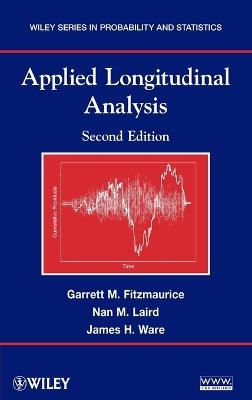
Applied Longitudinal Analysis
John Wiley & Sons Inc (Verlag)
978-0-470-38027-7 (ISBN)
Praise for the First Edition ". . . [this book] should be on the shelf of everyone interested in . . . longitudinal data analysis."
—Journal of the American Statistical Association
Features newly developed topics and applications of the analysis of longitudinal data
Applied Longitudinal Analysis, Second Edition presents modern methods for analyzing data from longitudinal studies and now features the latest state-of-the-art techniques. The book emphasizes practical, rather than theoretical, aspects of methods for the analysis of diverse types of longitudinal data that can be applied across various fields of study, from the health and medical sciences to the social and behavioral sciences.
The authors incorporate their extensive academic and research experience along with various updates that have been made in response to reader feedback. The Second Edition features six newly added chapters that explore topics currently evolving in the field, including:
Fixed effects and mixed effects models
Marginal models and generalized estimating equations
Approximate methods for generalized linear mixed effects models
Multiple imputation and inverse probability weighted methods
Smoothing methods for longitudinal data
Sample size and power
Each chapter presents methods in the setting of applications to data sets drawn from the health sciences. New problem sets have been added to many chapters, and a related website features sample programs and computer output using SAS, Stata, and R, as well as data sets and supplemental slides to facilitate a complete understanding of the material.
With its strong emphasis on multidisciplinary applications and the interpretation of results, Applied Longitudinal Analysis, Second Edition is an excellent book for courses on statistics in the health and medical sciences at the upper-undergraduate and graduate levels. The book also serves as a valuable reference for researchers and professionals in the medical, public health, and pharmaceutical fields as well as those in social and behavioral sciences who would like to learn more about analyzing longitudinal data.
Garrett M. Fitzmaurice, ScD, is Professor in the Department of Biostatistics at the Harvard School of Public Health and Director of the Laboratory for Psychiatric Biostatistics at McLean Hospital. A Fellow of the American Statistical Association and advisor for the Wiley Series in Probability and Statistics, Dr. Fitzmaurice's areas of research interest include statistical methods for analyzing discrete longitudinal data and methods for handling missing data. Nan M. Laird, PhD, is Professor of Biostatistics at the Harvard School of Public Health. A Fellow of the American Statistical Association and Institute of Mathematical Sciences, she has published extensively in the areas of statistical genetics, longitudinal studies, missing or incomplete data, and analysis of multiple informant data. James H. Ware, PhD, is Frederick Mosteller Professor of Biostatistics at the Harvard School of Public Health. A Fellow of the American Statistical Association and statistical consultant to the New England Journal of Medicine, he has made significant contributions to the development of statistical methods for the design and analysis of longitudinal studies.
Preface xvii Preface to First Edition xxi
Acknowledgments xxv
Part I. Introduction to Longitudinal and Clustered Data
1. Longitudinal and Clustered Data 1
2. Longitudinal Data. Basic Concepts 19
Part II. Linear Models for Longitudinal Continuous Data
3. Overview of Linear Models for Longitudinal Data 49
4. Estimation and Statistical Inference 89
5. Modelling the Mean: Analyzing Response Profiles 105
6. Modelling the Mean: Parametric Curves 143
7. Modelling the Covariance 165
8. Linear Mixed Effect Models 189
9. Fixed Effects versus Random Effects Models 241
10. Residual Analyses and Diagnostics 265
Part III. Generalized Linear Models for Longitudinal Data
11. Review of Generalized Linear Models 291
12. Marginal Models: Introduction and Overview 341
13. Marginal Models: Generalized Estimating Equations (GEE) 353
14. Generalized Linear Mixed Effects Models 395
15. Generalized Linear Mixed Effects Models: Approximate Methods of Estimation 441
16. Contrasting Marginal and Mixed Effects Models 473
Part IV. Missing Data and Dropout
17. Missing Data and Dropout: Overview of Concepts and Methods 489
18. Missing Data and Dropout: Multiple Imputation and Weighting Methods 515
Part V. Advanced Topics for Longitudinal and Clustered Data
19. Smoothing Longitudinal Data: Semiparametric Regression Models 553
20. Sample Size and Power 581
21. Repeated Measures and Related Designs 611
22. Multilevel Models 627
Appendix A. Gentle Introduction to Vectors and Matrices 655
Appendix B. Properties of Expectations and Variance 665
Appendix C. Critical Points for a 50:50 Mixture of Chi-Squared Distributions 669
References 671
Index 695
| Erscheint lt. Verlag | 30.9.2011 |
|---|---|
| Reihe/Serie | Wiley Series in Probability and Statistics |
| Zusatzinfo | Graphs: 51 B&W, 0 Color |
| Verlagsort | New York |
| Sprache | englisch |
| Maße | 152 x 234 mm |
| Gewicht | 1134 g |
| Themenwelt | Mathematik / Informatik ► Mathematik ► Wahrscheinlichkeit / Kombinatorik |
| ISBN-10 | 0-470-38027-6 / 0470380276 |
| ISBN-13 | 978-0-470-38027-7 / 9780470380277 |
| Zustand | Neuware |
| Haben Sie eine Frage zum Produkt? |
aus dem Bereich


